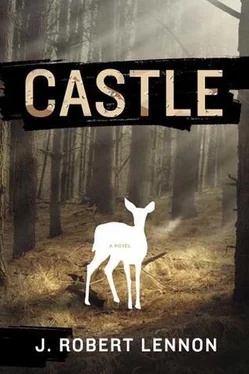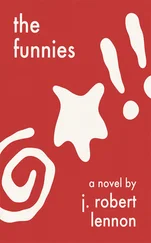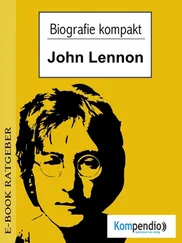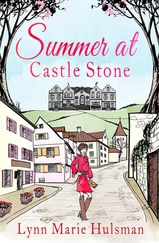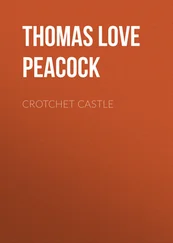She looked up at the Professor, then at my father, who had slid down in his chair and was staring at his hands, folded on his belly. Some of the food I’d spat out had struck his shirtsleeve just above the elbow. He did not appear to notice it there.
Finally my mother’s eyes returned to mine. Her gaze was cold.
“Mrs. Loesch? Tell me what you see.”
She did not look at him as she spoke; her eyes remained on my face, but she appeared to be looking elsewhere, someplace far from this room. Her cheeks were still wet, but her eyes were dry now, as if the tears had been burned away. She said, “A train.”
With the pronouncement of these words, Professor Stiles released me from his grip. I slumped in my chair, coughing, and found suspended in front of my face, gently held by the Professor’s long pale fingers, a die-cast toy locomotive. After a moment, his face appeared beside it.
“For you,” he said.
This train was something I wanted very badly. I had seen it, in fact, just that week, at the toy shop in downtown Milan, displayed in the front window along with a collection of cars that linked to it. But it was the locomotive I wanted the most. Sleek, black, with windows of real glass and a precise red and white stripe running down its flank, it was a marvelous toy. It looked nothing like a gun, of course.
It is difficult to remember what, precisely, was going through my mind at that moment. I had just been through an unprecedented experience, but I cannot say that I was ever actually frightened, in spite of my mother’s apparent breakdown. This may seem like a strange thing for me to say, but it is true. My father, of course, had never moved from his chair, and had never once seemed worried as events unfolded. And there was something about Doctor Stiles’s hand, the particular way it gripped my shoulder — firm, of course, nearly to the point of injury, but also somehow reassuring. I was not often touched by my parents; ours was an undemonstrative family. Perhaps I was simply unaccustomed to this kind of contact and relished it for its novelty. At any rate, I was not afraid, merely puzzled. I had no idea what had just happened, or why, and understood only that, in the wake of an unpleasant minute, I was being offered something I wanted.
I raised my hand to take the train.
“Don’t touch that, Eric,” said my mother.
I looked at her, my hand frozen in the air, waiting for her to change her mind. Her anger was fully realized now, enveloping her face like a mask.
My father spoke now, sitting up straight with a little grunt. His voice was quiet, cowed, and strained. “Oh, now, how about—”
“Don’t touch it, Eric,” she said again, and then shifted her gaze over my shoulder, to where Professor Stiles was standing. “And you get out of my house.”
“Now, Cybele,” my father began with a sigh.
“Out!” she spat. “You’re sick. You’re a sick man.”
“Mrs. Loesch,” the Professor said quietly, taking a step away from me. The train went with him, and I watched it slip back into his jacket pocket. “I was merely illustrating that—”
“I don’t care what you were illustrating,” my mother said. “I want you to leave. You’re terrible, horrible. How could you do that to a boy?”
“Look at him, Cybele, he’s fine!” It was my father, his open hand thrust out toward me. “He knew it was a trick, you were the only one who was fooled!”
She scowled at me, as though I had betrayed her. But I had done nothing other than sit there, waiting for it to end.
“He might have choked to death on his food,” she offered weakly.
“Come on,” my father said with a nervous chuckle. “There was never any chance of that.”
My mother leaned back in her chair and closed her eyes, and I watched as her anger and fear gave way to exhaustion. She let out a long breath. The battle was over; she had lost.
But Professor Stiles did not return to his seat. Instead, he apologized to my mother. “Mrs. Loesch, I’m sorry. I never dreamed that this demonstration would have such an effect on you. Of course you’re right; it was rude of me. I’ll leave you to finish your meal in peace.” My mother opened her eyes to stare at him, and for a moment I thought that she would actually insist that he stay — would get up, take him by the arm, and lead him back to his chair. But she could not capitulate so completely. She stayed where she was. Perhaps she was just too tired.
Professor Stiles patted me on the head, then walked around behind me to shake my father’s hand. My father rose and accompanied him to the door. A few moments later, he returned to the table.
There was no question of finishing our meal. No one had any appetite anymore. We sat in silence as we listened to Professor Stiles’s car start up and drive away.
During this interval, I watched my father change. He had sat down a defeated and humiliated man, the architect of a crashing failure. But he crossed his arms over his chest, as if gathering together the parts of himself, and began to concentrate. His brow furrowed, his lower lip stuck out, and his jaw first twitched, then trembled, and finally settled into a slow grind. As the minutes went by, his eyes regained their luster, and the angles came back into his face, and I could see that he was to emerge from his trance in a state of righteous indignation.
The transformation filled me with both pride and unease. I did not like to see my father defeated, and it pleased me to watch the life return to him. But I understood that it was my mother who would be forced to bear the brunt of this new vitality. It had only taken perhaps ninety seconds — he began to shift his body and to emit small, outraged grunts. My mother, hearing them, stiffened in her chair, sat up a bit straighter, stared with greater intensity at a meaningless spot on the tablecloth.
“A professor, ” was the first thing my father said.
“A distinguished professor of psychology,” he elaborated a few seconds later. “Run out of our home.”
He waited a long half minute to speak again, this time to the ceiling, his head tipped far back, the tendons on his neck sticking out in sharp relief. “That’s who she decided she was smarter than, Doctor Avery Stiles. She decided she knew better than Doctor Avery Stiles. Because, after all, she is a brilliant professor with many advanced degrees, isn’t she? Isn’t she?
“Oh, that’s right,” he went on. “No. No, she’s not. She’s a plain old regular housewife who didn’t even finish high school. But of course she knows better anyway.
“Maybe she’s just embarrassed that she didn’t catch on? Maybe she’s upset because Professor Avery Stiles proved how stupid she is? Maybe that’s why she threw him out of her house. Because he told her a truth that she didn’t want to hear.
“Well, Doctor Stiles is used to that. Perhaps that’s why he was so polite, even after being told to leave our humble home. Because he’s used to telling people things they don’t want to hear. That’s why his colleagues have abandoned him. With their communist ideas. They don’t like being told they’re weak. They don’t want to hear it. They don’t want to admit that the enemy is them. ”
My father was shaking his head slowly, his face compressed, as though he were crushing his teeth together inside his closed mouth. My mother, for her part, was highly alert, her eyes wide, her body very still.
“I want to tell you something,” he said now, speaking to her directly. He stood up, and his chair slid back and rattled against the breakfront. My mother flinched. “I want to tell you something about that man you kicked out. The man you threw out of our home — who you just expelled from our family. That man has no family, Cybele. You know why? They died. His daughter, his wife — they got sick and they died. He has been alone for five years. What kind of man is that, who can bear the death of his whole family? If it was me, I know what I would do — I would put an end to it all right then and there. I would just put an end to it. And don’t think I haven’t considered it anyway, Cybele, because I barely even have a family as it is. I have a daughter who’s never home, and a wife who doesn’t care, and doesn’t respect me. And I have a son who just sits there”—his arm was thrust out now, pointing at me, and he had raised his voice nearly to a shout—“doing nothing, saying nothing, like some kind of goddam zombie. And whose fault is that, Cybele? Who does he get that from? Who just sits and says nothing, and does nothing, and never shows any sign of life?”
Читать дальше
